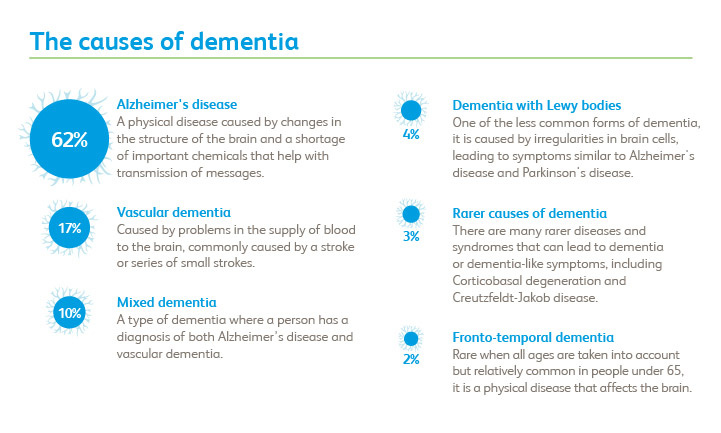
What is early stage Alzheimer’s and why is it so difficult to diagnose?
Dementia describes a set of symptoms which are likely to include memory loss and difficulties in thought processing. Symptoms often do not appear until there is significant damage to the brain, but even while the symptoms are mild, sometimes almost unnoticeable, they can be significant enough to affect a person’s day to day life.
Diagnosis of early stage dementia is made challenging by both the type and degree of symptom variation. Emerging symptoms are linked to the area of the brain where deterioration has occurred, and the type of dementia the patients has developed. Brain structures necessary for the retention of new information, such as the hippocampus, appear to be particularly susceptible to early stage brain deterioration. Further influences on early cases detection are the life-style demands of the patient, and their response to the disease.
 What are the benefits in using early stage sufferers in trials as supposed to late stage sufferers and is this outcome translatable?
What are the benefits in using early stage sufferers in trials as supposed to late stage sufferers and is this outcome translatable?
The benefit of targeting early stage patients is that treatments can be used to reduce, and possibly halt, any further brain degeneration. Patients at this stage of the disease also tend to have fewer symptoms and relatively intact cognitive function, making communication between the subject and the researchers or doctor a lot clearer. This allows for a more straightforward analysis of treatment outcomes.
Identifying ways to target specific brain areas affected by the disease may allow for a better understanding of the combination of therapies needed to treat the advanced and complicated late stage disease in which multiple brain areas are affected.
Why were new guidelines needed?
For the past 10 years there has been a curious impasse regarding the selection of cognition tests for use in Alzheimer’s disease (AD) clinical drug trials. The ‘gold standard’ for assessing cognition according to popular belief has been the ADAS-cog, a test comprized of 11 tasks measuring the disturbances of memory, language, praxis, attention and other cognitive abilities which are often referred to as the core symptoms of AD.

However there has been extensive, and justified, criticism of the scale for at least the last 15 years. A key reason for this criticism has been that in mild patients, performance on the praxis, naming and language subtests has tended to be at ceiling, leaving no room on these tests to demonstrate improvement. A further source of criticism has been the absence of acceptable measures of cognitive domains known to be impaired in the very earliest stages of the disease, such as executive functions, attention and working memory.
Some authors have recommended additional measures to broaden the ADAS-cog, but the subtests that made it into clinical trials failed to deliver due to ceiling effects (the ‘Mazes’ subtest), poor scoring or administration methodologies (Digit Cancellation and Concentration/Distractibility respectively), and floor effects (Delayed Word Recall). Sponsors have nevertheless doggedly stuck to the use of the ADAS-cog, in spite of advice from FDA representatives as early as 2008 to select more appropriate measures.
Some headway was made with the use of the NTB in the study of AN1792. This collection of well-known clinical measures helpfully captured cognitive preservation in those patients with highest levels of antibody titre. However, many of the NTB tests revealed range restriction issues, and in moderate stage patients could require assessments of 2-3 hours.
What are the strengths of the new guidelines?
In contrast to the drug development community, clinical and academic studies of AD cohorts have pioneered the use of both traditional ‘paper-and-pencil’ and computerized cognitive testing. These approaches have in the past few years been picked up by enterprising drug development companies and used to good effect in proof of concept studies. The most recent example of this was the use of elements from the CogState assessment to capture positive effects in the study conducted by Probiodrug. Other sponsors, including Forum Pharma, have employed alternative paper-and-pencil testing to good effect.

Regulators, and especially the FDA, have encouraged innovation in this area, and the new draft guidance is the most explicit and recent example of this. The guidance specifically calls for the use of ‘sensitive neuropsychological tests’ and ‘measures’, descriptions that could not be justifiably be applied to most ADAS-cog subtests. In this respect the guidance is a hugely helpful development.
Also helpful is that the agency does not specify particular measures for use. This approach is to be warmly welcomed. A two-step strategy of i) identifying key cognitive domains of interest and then ii) selecting reliable, sensitive and valid measures, has, for a number of commentators since 1997, the most appropriate method for selecting objective tests of cognition.
Can this be applied to other countries?
Some companies, such as Probiodrug and Axon Neuroscience, have already incorporated sensitive tests and measures into their trials and might well be rewarded for their enterprise. However, for many the ADAS-cog continues to be selected as the assessment of choice. A number of new cognitive assessments are currently the subject of validation, an activity that will likely assist with their adoption. However, for many drug developers the ultimate proof will be evidence to support claims of ‘assay sensitivity’ i.e. capable of capturing positive treatment effects.
Comments